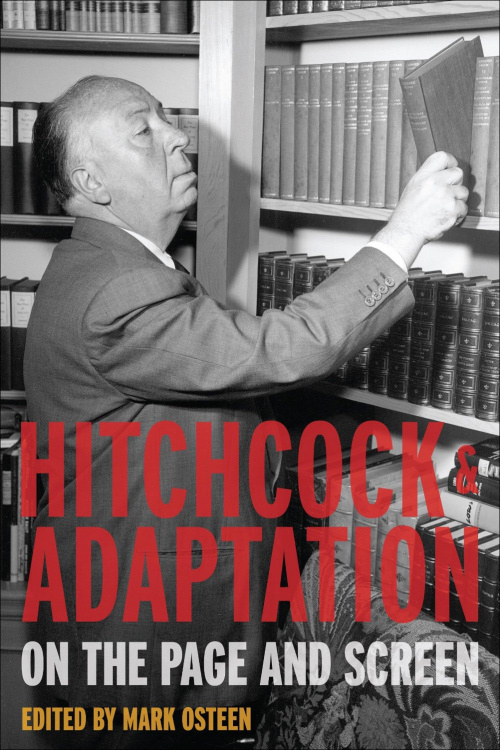Hitchcock and Adaptation: On the Page and Screen (2014) edited by Mark Osteen
 | |
| Mark Osteen | |
| Rowman & Littlefield Publishers (2014) | |
| ISBN 9781442230873 (hardback) | |
Product Links
Synopsis
From early silent features like The Lodger and Easy Virtue to his final film, Family Plot in 1976, most of Alfred Hitchcock's movies were adapted from plays, novels, or short stories. Hitchcock always took care to collaborate with those who would not only execute his vision but shape it, and many of the screenwriters he enlisted — including Eliot Stannard, Charles Bennett, John Michael Hayes, and Ernest Lehman — worked with the director more than once. And of course, Hitchcock's wife, Alma Reville, was his most constant collaborator, working with him since the 1920s. In "Hitchcock and Adaptation: On the Page and Screen", Mark Osteen has assembled a wide ranging collection of essays that explore how Hitchcock and his screenwriters transformed literary and theatrical source material into modern masterpieces of cinema. Some of these essays look at adaptations through a particular lens, such as queer aesthetics applied to Rope, Strangers on a Train, and Psycho, while other essays tackle the issue of Hitchcock as author, auteur, and adaptor. Other film adaptations that garner discussion in this volume include Sabotage, The Secret Agent, The 39 Steps, Rebecca, Shadow of a Doubt, Lifeboat, Rear Window, Vertigo, and Frenzy. These close examinations of Hitchcock and the creative process illuminate the significance of the materials he turned to for inspiration — and the men and women who helped bring his artistic vision from the printed word to the silver screen. A fascinating look into an underexplored aspect of the director's working methods, Hitchcock and Adaptation will be of interest to film scholars and fans of cinema's most gifted auteur.
Contents
Part I: Hitchcock and Authorship
- Hitchcock the Author — Thomas M. Leitch
- Wrong Men on the Run: The 39 Steps as Hitchcock's Espionage Paradigm — Walter Raubicheck and Walter Srebnick
- The Role and Presence of Authorship in Suspicion — Patrick Faubert
Part II: Hitchcock Adapting
- Melancholy Elephants: Hitchcock and Ingenious Adaptation — Ken Mogg
- Conrad's The Secret Agent, Hitchcock's Sabotage, and the Inspiration of "Public Uneasiness" — Matthew Paul Carlson
- Stranger(s) than Fiction: Adaptation, Modernity, and the Menace of Fan Culture in Hitchcock's Strangers on a Train — Leslie H. Abramson
- Reading Hitchcock/Reading Queer: Adaptation, Narrativity, and a Queer Mode of Address in Rope, Strangers on a Train, and Psycho — Heath A. Diehl
- "Dear Miss Lonelyhearts": Voyeurism and the Spectacle of Human Suffering in Rear Window — Nicholas Andrew Miller
- "The Proper Geography": Hitchcock's Adaptation of Daphne du Maurier's "The Birds" — John Bruns
- From Kaleidoscope to Frenzy: Hitchcock's Second British Homecoming — Tony Williams
Part III: Hitching a Ride: The Collaborations
- Hitchcock's Diegetic Imagination, Thornton Wilder, Shadow of a Doubt and Hitchcock's Mise-en-Scène — Donna Kornhaber
- "The Name of Hitchcock! The Fame of Steinbeck! The Legacy of Lifeboat — Maria A. Judnick
- "What Did Alma Think?": Continuity, Writing, Editing, and Adaptation — Christina Lane and Jo Botting
Part IV: Adapting Hitchcock
- The Second look, the Second Death: W.G. Sebald's Orphic Adaptation of Hitchcock's Vertigo — Russell J.A. Kilbourn
- Dark Adaptations: Robert Bloch and Hitchcock on the Small Screen — Dennis R. Perry and Carl H. Sederholm
- Extraordinary Renditions: Delillo's Point Omega and Hitchcock's Psycho — Mark Osteen
- The Culture of Spectacle in American Psycho — David Seed
